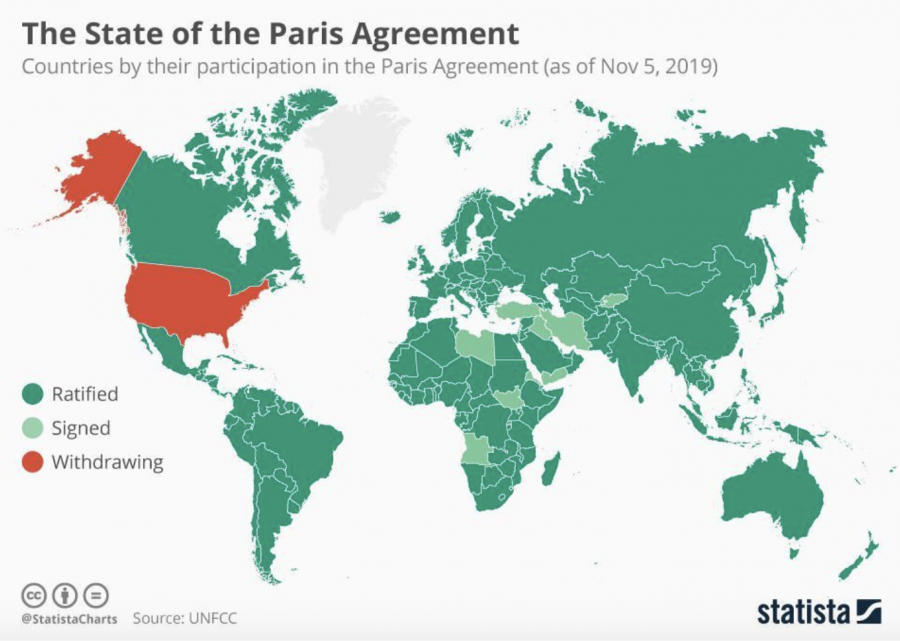The US Officially Begins Exit from the Paris Climate Accord
December 4, 2019
President Trump has began the official withdrawal of the US from the Paris Climate Agreement. The withdrawal is projected to be completed by November 4, 2020. This will make the United States the only country in the world that is not part of the Agreement.
The Paris Climate Agreement was signed in 2015 to address and solve the issue of global warming and to create solutions to eliminate or reduce the causes of global warming, mainly greenhouse gas emissions. The agreement set a goal to limit global warming to 1.5 degrees Celsius above the preindustrial average over the next century. It differs from its predecessor, the Kyoto Protocol which was adopted in 1997, but it did not include many of the developing countries such as China or India. This made America reluctant to sign it, as the Bush Administration believed it would hurt the US economy.
Due to the lack of commitment and the exclusion of developing nations and large emitters, the Kyoto Protocol was ineffective. Despite its drawbacks, plans were made to extend it until 2020, when a new agreement would have been sorted out. The new Agreement was the Paris Agreement, and was put into effect 4 years earlier than planned, in 2016. The Paris Agreement, unlike the Kyoto Protocol, includes almost every nation, instead of only the developed ones. This meant that all countries must contribute, but has no penalties if countries fall short of their goals.
The Trump Administration and many politicians believe that the effort to solve climate change is undermining the United States’s economy and potential to expand. Others also claim that the goals set by the Paris agreement are unrealistic and futile. Recently, Secretary of State Mike Pompeo wrote on Twitter that “The U.S. is proud of our record as a world leader in reducing all emissions, fostering resilience, growing our economy, and ensuring energy for our citizens. Ours is a realistic and pragmatic model.” [1] He claims that the goals made by the Paris Agreement are unrealistic and unachievable.
However, according to an article by National Geographic [2], even if the goals seem impractical, they aren’t enough to keep global warming levels below 2 degrees Celsius. However, the effects of reducing these goals will bring severe detrimental problems to the environment, such as an increase in the rate of melting ice caps and the extinction of species in changing climates.
Despite the US being the only country that is withdrawing from the treaty, it is the leader in cutting down on emissions, with emissions declining by 758 million metric tons from 2005 – 2017. This is nearly the same as the entire European Union’s efforts, which reduced emissions by 770 million metric tons.
In addition, the Trump administration’s push towards fossil fuels is also hurting the national economy. Already, the number of jobs related to green energy outnumber those related to fossil fuels by 3 to 1 and it is a quickly growing industry, with a job increase of 3.6% in 2018. However, due to the administration’s recent actions, many businesses related to renewable energies will suffer from a lack of national support and a loss of trust from international committees. Many analysts and researchers also note that the costs related to inaction of emission reduction would outweigh the costs of actively trying to solve the issue, and could cost the country up to 6 trillion dollars in the coming decades.
Also, if the US pulls out of the International Agreement, it will make other countries such as China and Russia the leaders in that field. This would give them a higher position in global leadership, meaning that some countries may no longer look to the United States when it comes to aid; this in turn, limits the global dominance of the US. China is currently the largest producer of wind and solar energy, and leads the way in financial investment into renewable energy [3]. They also have goals to be the world leader in renewables, and when the US leaves the Paris Climate Agreement, China is likely to take the number one spot.
Even if the next presidential administration rejoins the Paris Climate Accord, it will be difficult for the US to climb back to the number one title, as China would systematically have taken advantage of the power vacuum, and would have a significant influence on the Paris Agreement. Also, the US will have lost confidence from its allies about upholding to their pledges.
Furthermore, if a country like the United States pulls out of the Agreement, it may become a justification for other countries to also pull out and cut efforts to renewables, as it is a costly project. Already, the UK chancellor is attacking the Net Zero goal for 2050 that the country had set up this year. If many countries do follow the US and reduce emission policies, it will be even more strenuous for the world to recover later on.
The issue of climate change is a major threat to future generations for all species, not just humans. With an increase in temperature, there is a change in sea levels, and more importantly, weather patterns and climate. Shifts in climate by even half a degree can have detrimental effects on the ecosystems living in the area, forcing some species to relocate and even threatening extinction [4]. As populations decline and more species go extinct, the lack of biodiversity would also threaten entire ecosystems, and the remaining wildlife would be more subject to extinction from diseases and the lack of ability to adapt.
The imbalance in ecosystems and loss of biodiversity can lead to detrimental effects for humans. For example, both wheat and corn will have a harder time growing as the climate shifts, which would impact the diets of millions of people all over the world. Also, a loss of biodiversity makes plant and animal species more susceptible to disease and consequently, extinction, which will further reduce biodiversity and cause ecosystems to decline. Because of how balanced ecosystems need to be, a loss of one single population could cause an entire ecosystem to deteriorate, depending on its interconnections with other species.
As pressure mounts and the issue becomes more urgent, it is important that all countries make their best efforts to solve the issue of climate change. This is not an issue that can be solved through the full effort of one country, but rather through the effort of a united world. As leaders of the world and some of the top producers of greenhouse gasses, major countries such as the United States are expected to contribute all they can to limit global warming and emissions. If the US pulls out, it may create a domino effect in which more countries begin to remove themselves from the Paris Agreement in order to avoid the short term hardships of paying and limiting emissions. However, in the long run, it is important that a true global effort is made to solve the issue.
[1] https://twitter.com/secpompeo/status/1191455541052289024?lang=en
[2] https://twitter.com/SecPompeo/status/1191455541052289024https://www.nationalgeographic.com/science/2019/11/nations-miss-paris-targets-climate-driven-weather-events-cost-billions/
[4] https://www.nytimes.com/interactive/2018/10/07/climate/ipcc-report-half-degree.html




Sarah Ouyang • Feb 10, 2021 at 8:26 am
I loved the professional structure- laid out the history of the issue and then built into its significance in the modern world